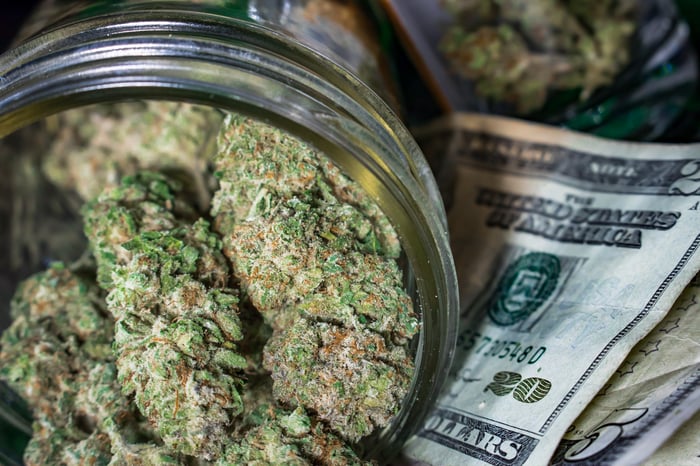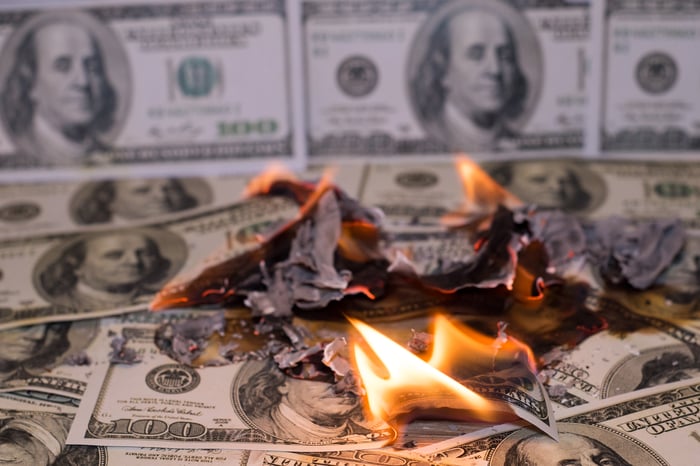Few industries offer the excitement and long-term growth potential of the legal marijuana industry. After generating $12.2 billion in global sales in 2018, worldwide cannabis sales are expected to blossom to more than $31 billion by 2022, and hit $50 billion (or higher) by the end of the next decade. That's a compound annual growth rate of about 12.5% over the next 12 years, and this is a generally conservative estimate.
The reality is that these revenue dollars have to wind up somewhere, and with $50 billion on the line, it's pretty clear there will be at least a handful of long-term winners. Of course, identifying those winners with concrete accuracy in any high-growth industry is challenging.

Image source: Getty Images.
Since 2016, most marijuana stock valuations have ascended to the heavens, removing the allure of buying pot stocks. Companies like Cronos Group, which sports a $5.2 billion market cap, is only capable of perhaps 120,000 kilos of peak production, and is valued at north of 210 times forward earnings. Similarly, Aurora Cannabis, Canada's projected leading producer at 780,000 kilos a year at peak capacity, may not even be profitable in fiscal 2020 due to expansion costs. Yet it's lugging around an $8.5 billion valuation.
In other words, it's difficult to get good value for your money in an extremely hyped industry. However, there is one company that offers a pretty insane value proposition, but also comes with its fair share of risks. In terms of bang for your buck, it's really difficult to top Aleafia Health (ALEAF 10.22%).
This pot stock is the best bang for your buck
Haven't heard of Aleafia Health? Don't be ashamed. I'd bet there are a lot of investors that have never heard of Aleafia Health before, and that's a big reason why it's been able to fly under the radar -- and keep a reasonable valuation -- for so long.
Rather than simply growing marijuana and trying to out-produce its peers, Aleafia has been first and foremost focused on operating its network of Canabo medical cannabis clinics. The cannabis clinic model allows Aleafia to prescribe marijuana to medical patients, while at the same time keeping these patients loyal to the company's vertically grown supply. This is a good thing considering that medical marijuana patients tend to use pot products more regularly, purchase product more often, and are more likely to consume higher-margin alternative pot products relative to adult-use consumers. Presumably, this should yield higher operating margins than its peers.
However, things have gotten a lot more exciting over the last five weeks for Aleafia Health. Just over a month ago, Aleafia Health completed a transformative all-stock acquisition of Emblem, which has a similar medical clinic and vertically integrated production and processing model. The combination of the two companies increased their total medical clinic presence to 40, as well as upped the number of patients treated to date to approximately 60,000.

Image source: Getty Images.
Furthermore, it combines Aleafia Health's 98,000 kilos in peak production capacity when operating fully with the 40,000 kilos that Emblem can bring to the table. At 138,000 kilos of peak annual output, Aleafia Health, despite only being secondarily focused on its growing operations, could be Canada's seventh-largest grower, ahead of the aforementioned Cronos Group.
Then, earlier this week, Aleafia Health announced that it would be adding 50,000 kilograms of extraction capacity at its Paris, Ontario, processing facility. The company's press release notes that it's secured a partial occupancy permit from the local government, but would need to submit a license amendment application to Health Canada, as well as receive a final municipal occupancy permit prior to operations commencing. The expectation is that this added extraction capacity will aid Aleafia in diversifying its product line to include high-margin cannabinoid-based products.
So, just to recap, Aleafia Health promises 138,000 kilos of controlled production, 50,000 kilos of now-added extraction capacity, and has wholesale purchase agreements in place for acquiring 175,000 kilos from Aphria over five years, and 9,000 kilos from Tilray over three years. Its market cap for all of this? Less than $320 million! That's why Aleafia is the best bang for your buck.
There's no such thing as a risk-free or surefire investment
But Aleafia Health is no surefire winner. Here's a rundown of some of the risks investors have to be aware of.
For starters, while the combination of Aleafia Health and Emblem helped combine the cash and cash equivalents of both companies, additional capital raises are very likely. Aleafia Health is still in the thick of building out its growing and processing capacity, which means there's a very good chance that it'll be burning through money for the next couple of quarters at a minimum. Raising money probably means selling shares of common stock, thereby diluting existing shareholders.

Image source: Getty Images.
Building on this first point, even though the medical clinic model looks to present a high-margin opportunity for Aleafia, the company's production is still years away from hitting full capacity. Translation: Investors are liable to see Aleafia lose money in 2019, and perhaps even 2020, as it ramps up its vertical operations.
Another issue is the fact that Aleafia Health may struggle to uplist to a reputable exchange in the United States. Despite uplisting to the Toronto Stock Exchange in Canada, Aleafia is pretty much stuck on the over-the-counter exchange in the U.S. because of its low share price ($1.14 per share, as of Tuesday, April 16). The Nasdaq has a minimum share price of $1 for listing, and the only logical solution for the company at this point, if it wanted to uplist, would be a reverse split. Generally speaking, reverse splits are associated with struggling, not thriving, companies.
And finally, it's unclear whether Aleafia's patient network will be able to gobble up all of the product that the company is bringing to the table. It hasn't exactly been busy enough on the marketing, branding, and supply deal front if patient demand isn't as strong as expected.
Make no mistake about it, you won't find a better bargain than Aleafia Health if everything works out. The question is: Will everything work out?





